Scrapper director Charlotte Regan: ‘I don’t want working class stories to always be about trauma’
With her debut Scrapper, director Charlotte Regan wanted to bring joy to social-realist cinema.
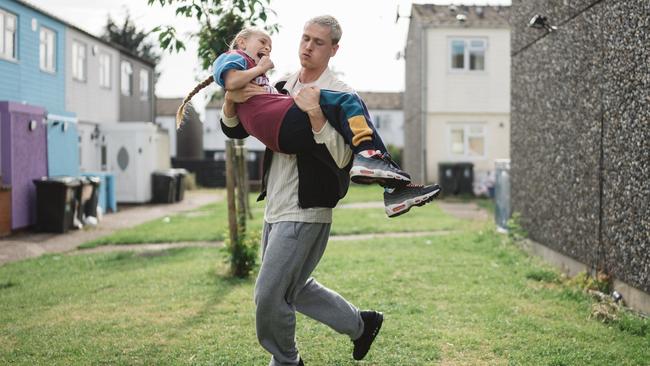
British cinema sometimes presents working-class life as being dour and colourless, but Charlotte Regan’s childhood on a council estate in north London was nothing like that. The young director was “surrounded by love, joy and humour”, and it’s a similar energy that she brings to her debut feature, Scrapper – a soulful slice-of-life comedy set on a confectionery-coloured council estate in Essex.
“Working-class worlds aren’t always super-desaturated,” she says. “People don’t just stand around talking about their hardships. It’s mostly love in their life and the best kind of humour.”
Scrapper, which premiered at the Sundance Film Festival in January and took out the grand jury prize, orbits around a precocious 12-year-old girl called Georgie (played by brilliant newcomer Lola Campbell) who, after the death of her mother, lives alone in her council house after having convinced clueless social workers that her uncle Winston Churchill is caring for her.
She scrapes together the rent by nicking and souping up neighbourhood bikes with her best mate, Ali (Alin Uzun). It’s a racket that works for her until her bleach-blond father, Jason (Harris Dickinson), returns from a long absence in Spain and upends the peace.
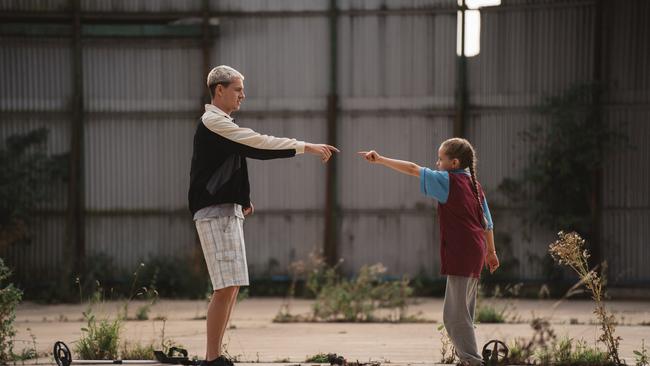
The film’s bubbly tone and dreamy aesthetic – Regan fought to get the exteriors of houses on the council estate painted in storybook pastels – is radically different from the Loachian drabness we’ve come to expect from working-class films.
While Scrapper is not autobiographical, Regan says she was “massively drawn to” the council flats and houses she moved between with her mum and nan when she was growing up. “From the balcony of my mum’s flat you could see the main place where all the kids would play,” she says. “As soon as you’d wake up you could hear them and you’d want to go outside. It felt like you were living in a holiday camp. It felt so safe. There’s just such a sense of community, with all the grandmas that live there, watching the kids.”
Regan’s initial plan for Scrapper was to make a “Guy Ritchie-esque” comedy about a teenage boy dodging drug dealers, but the untimely death of her father and nan reshaped the narrative, and she channelled her loss into the character of Georgie.
“I was going through grief,” she says. “It’s just that thing where you’re experiencing something so you feel like you have to write it. Which is why we all write about our dad issues and our grief issues, isn’t it? Because you can’t help it.”
While the story changed dramatically, Regan was determined that it be centred on the working class. “It’s maybe something I will stick with for my whole career,” she says. “I just want working-class characters to not only have screen time when they’re being defined by their class. I don’t want their stories to always be about hardship and trauma.
“You can put a working-class character into a genre film, and that’s fine. They can exist within those worlds. So for me, that will always be at the heart of it.”
In Britain, the scales overwhelmingly are tipped against working-class artists. A study last year from the British Sociological Association found the number of actors, musicians and other creatives coming from working-class backgrounds had fallen by half since the 1970s. Recent statistics revealed only 5 per cent of students at the London Academy of Music and Dramatic Art came from a low-income background, while the Royal Academy of Dramatic Art had none.
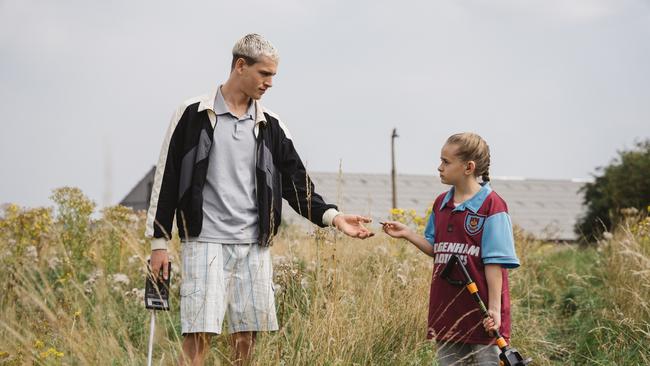
And when working-class actors manage to smash through the class ceiling, they often meet discrimination. Scrapper star Dickinson – who got his breakout role in Ruben Ostlund’s Triangle of Sadness, which won the 2022 Cannes film festival Palme d’Or – recently recalled an incident where an older actor took the mickey out of him because of his background.
“He humiliated me in front of all of these other actors, and it’s difficult for that not to affect you, especially if you’re young,” he told The Times.
When it came to casting the children in Scrapper, Regan was hellbent on hiring untrained actors. “I always wanted to street-cast kids because I think kids exist in films,” she says. “They aren’t acting at that age because they’re not self-aware enough.”
The director says Dickinson “was so selfless and offered so much of himself” to the young actors on set, “like way beyond the norm”.
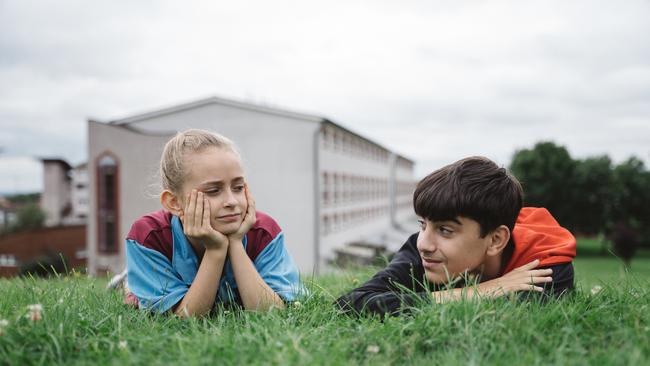
“I’ve worked with great actors who have supported street-cast kids but never to the extent that Harris has,” Regan says. “He’s great with boundaries and moral grey areas. He’s conscious that you’re becoming a really important part of these kids’ lives for a window of time but can’t promise you’re going to be part of their lives forever. He never pretended to offer more than he can sustain.”
Campbell won the role of the lippy and resourceful Georgie with an audition tape that completely disregarded Regan’s brief. Instead, the then 11-year-old rattled off a monologue about her addiction to Home Bargains, a variety store.
“Lola is the best actor I’ve ever worked with and will always be the best actor I’ve ever worked with,” Regan says. “You can give me Daniel Day-Lewis and I’ll still think that Lola is better.”
Most of the film’s best dialogue is Campbell improvising, Regan says. “If you sit and have a cup of tea with her, you’ll hear stories about grandma serial killers that are turned into spiders. She can just chat pure shite for days, it’s a real skill.”
Working with street-cast kids brought a special atmosphere to the set.
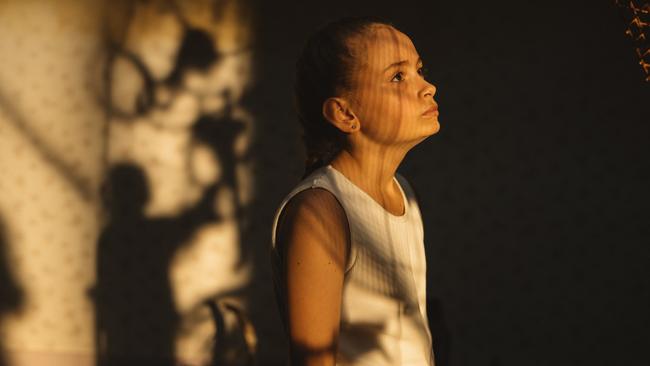
“Every day they would come into work and be excited about what we were doing, even if it was just changing the lens on a camera,” Regan says. “It made the rest of us remember what a fun job we’re doing. We’ve all had pinch-yourself moments – especially my working-class peers, who didn’t even know film and TV was a career option. But the kids make you remember that.”
“Pinch-yourself moments” have defined Regan’s career. Growing up, she never planned to be a filmmaker. Instead, she had grand ambitions of becoming a grime rapper. “I had a lot of mates who were grime rappers, so I went into the studio and recorded some songs in the hope that I too could become a grime rapper,” she says. “I was f..king shocking. I could tell from my friends’ reaction that this was not the career for me.”

She was 15 at the time and enamoured with the scene, so her friends came up with a way for her to be involved. They found her a DSLR camera and got her to start recording promos.
“It’s not that I loved filmmaking, I just loved that world,” she says. “Getting me a camera to film their videos was a way of staying. I could go to the studio and hang out within the grime scene because I loved it, but I had an actual purpose instead of just being a random little girl that hung about.”
Before long she was shooting music videos, first for her grime mates, then for household names such as Mumford & Sons and Stereophonics. And while she loved the form, “after making 50-plus of them, I wanted to tell a story”. She made her first short, Standby, which was scooped up by the Toronto International Film Festival and the London Short Film Festival, and earned her a BAFTA nomination.
“I didn’t really know what film was and what film festivals were, none of my family did arts or whatever,” she says. “People were approaching me, asking to help with my next film. It made me want to carry on because I wouldn’t have had a clue how to do it otherwise.”
Scrapper opens in cinemas on September 14.


To join the conversation, please log in. Don't have an account? Register
Join the conversation, you are commenting as Logout